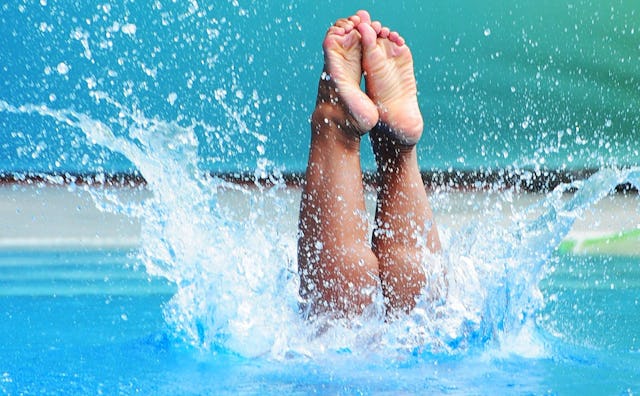Learning to Dive Into the Life I've Been Given

My classmates looked on encouragingly. I was 38, too old and too self-conscious to be a beginning diver. I tried not to make eye contact with anyone. Then, the silver lining to self-consciousness kicked in: At some point, not trying becomes even more conspicuous than trying. I put my hands together in inadvertent prayer, kicked off the block, and cut pretty cleanly into the water.
I found myself in that class because my third and youngest child was halfway through kindergarten. I felt as if I was finally coming up for air, so much so that I was looking around for self-improvement projects. Some of my friends were doing triathlons, but I knew that my swimming needed work. I grew up near water, and I love to submit to the power of the ocean waves and gaze at the patterns of the river. Technically, I could swim—but when I swam laps I always had the distinct feeling that I was drowning.
At the third class, the instructor asked us, “Any interest in learning to dive?”
I had interest in learning to dive when I was about 10. I spent some time at the side of the pool with friends, vaguely working on it, but it just didn’t happen. I had watched with pleasure as my first two children dove off the blocks at swim meets, over and over, without hesitation.
After class, I hopped in the shower, and as I began to rinse off, I found—somewhat to my surprise—that I was crying. I felt vaguely tricked, achieving a goal I had deliberately discarded, passed on, but I was also experiencing something like joy. I thought that door was closed. I thought I was too old. I thought I was too scared. I thought I was too embarrassed.
A few months later, I discovered that I was pregnant with my fourth child. I was excited because I felt as if my husband and I were now parenting pros. I knew how to nurse in an unsupportive chair. I always snagged a good job in the PTA, I could make dinner from a nearly empty pantry, and I trusted my pediatrician. We had three great kids and couldn’t wait to meet the fourth.
Unfortunately pregnancy four didn’t go smoothly, and my son was delivered at 32 weeks by emergency cesarean section. My son was tiny but perfect: “a feeder and a grower,” they said in the Neonatal Intensive Care Unit.
When he was six days old, a group B strep infection struck him, causing hemorrhages in his brain and lungs. He nearly died. He recovered, came home, but showed motor delays. My husband and I began to worry that he could not see. A prominent neuro-ophthalmologist confirmed our fears and gently added that the MRI of my son’s injured brain was one of the worst he had ever seen. We staggered out of the hospital into a blindingly bright July day and felt like we were drowning. My son began to have seizures. He received a diagnosis of cerebral palsy.
Every time I struggled to the surface, the waters closed back over my head, and there was a new pool to dive into almost every day.
The early years were a blur of appointments and therapies, interspersed with the exhaustion of recounting his history to both personal and professional acquaintances. I could not just submit to the waves, and I could not gaze out on the patterns of my life as they flowed by. I had to act, day after day, and be an advocate and an administrator and a teacher as well as a parent—to all of my children.
This year my son began taking the bus to kindergarten in his cute little red wheelchair, and I am starting to come up for air again. I already have plenty of projects, though, as I navigate the lanes of special education and try to plan for the future. Is there a new or different therapy we can add to the schedule? Would another school be a better choice than the one in town? What financial plans do we need to make for a lifetime of care?
I cannot be too old, too scared or too embarrassed to be his mother. Most days I manage to dive in. I don’t know if I’ll ever have that watershed moment when I cry in the shower, when I get to rinse off the fear, worry and regret.
I did finally manage to finish a triathlon. The swim was the hardest part. On the way out, I had to fight big waves. On the way back to shore, I tried to use them to my advantage. I didn’t cry at the end because I knew that I could do it. Once I dove in, I had to do it.
This article was originally published on